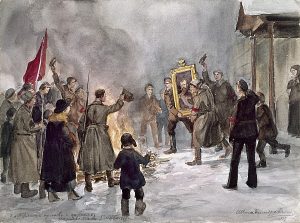
In 1917 in Britain, one of the government’s worst nightmares was developing. There had always been a ‘hard-core’ of opposition to the war on political, moral & religious grounds. Over the course of the war this opposition had developed as conscription was introduced. It began to be joined by industrial militancy as working conditions came under attack. With the February Revolution those opposed to the war could see an alternative and a way for the war to end. The authorities understood the threat this posed to Britain’s place in the war.
Aled’s talk reveals the activities of the British intelligence services in South Wales during the First World War, and examines their concern for the region’s threatening cocktail of industrial and social militancy and opposition to the war. From January 1916, the newly formed MI5 rapidly expanded in an attempt to combat the influence of a subversive combination of pacifism, socialism and industrial militancy. As the German threat from spies and espionage receded, the intelligence agencies re-directed their zeal at combating the enemy within. Aled studies the growth of the intelligence agencies in an industrial and labour context, highlights the monitoring activities and organisation of the intelligence services in south Wales, and considers the anti-war campaign that reached its height in 1917 bringing together under the banner of subversion, a toxic mix of support for the Russian Revolution, opposition to the war, and demand for workers’ control.
For more information email rememberingrealww1@gmail.com
Aled Eirug is the former head of news and current affairs at BBC Wales and is writing a book on Welsh opposition to the First World War.
Event details
Date: , 2017
Time: to
Venue: The Hydra Bookshop, BS2 0EZ
Price: Donations
With: Aled Eirug
Series: Remembering the Real WWI




